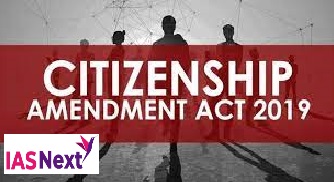CURRENT AFFAIRS
Get the most updated and recent current affair content on Padhaikaro.com
What are Citizenship (Amendment) Act Rules?
- IAS NEXT, Lucknow
- 11, Jan 2022

Reference News:
The Ministry of Home Affairs (MHA) has once again missed the deadline to notify the Citizenship (Amendment) Act, 2019 rules, the third extended deadline after the Act was passed.
- January 9 was the last day of an extension it sought from the two parliamentary committees in the Lok Sabha and the Rajya Sabha to frame the rules.
What’s the issue now?
Without rules, the Act cannot be implemented.
Background:
The Citizenship (Amendment) Act, 2019 (CAA) was passed by Parliament on December 11, 2019 and the Act was notified within 24 hours on December 12. In January 2020, the Ministry notified that the Act will come into force from January 10, 2020.
It seeks to amend the Citizenship Act, 1955.
- The Citizenship Act,1955 provides various ways in which citizenship may be acquired.
- It provides for citizenship by birth, descent, registration, naturalisation and by incorporation of the territory into India.
About CAA:
- The objective of the CAA is to grant Indian citizenship to persecuted minorities — Hindu, Sikh, Jain, Buddhist, Parsi and Christian — from Pakistan, Bangladesh and Afghanistan.
- Those from these communities who had come to India till December 31, 2014, facing religious persecution in their respective countries, will not be treated as illegal immigrants but given Indian citizenship.
- The Act provides that the central government may cancel the registration of OCIs on certain grounds.
Exceptions:
- The Act does not apply to tribal areas of Tripura, Mizoram, Assam and Meghalaya because of being included in the 6th Schedule of the Constitution.
- Also areas that fall under the Inner Limit notified under the Bengal Eastern Frontier Regulation, 1873, will also be outside the Act’s purview.
Issues surrounding the law:
- It violates the basic tenets of the Constitution. Illegal immigrants are distinguished on the basis of religion.
- It is perceived to be a demographic threat to indigenous communities.
- It makes illegal migrants eligible for citizenship on the basis of religion. This may violate Article 14 of the Constitution which guarantees the right to equality.
- It attempts to naturalise the citizenship of illegal immigrants in the region.
- It allows cancellation of OCI registration for violation of any law. This is a wide ground that may cover a range of violations, including minor offences.